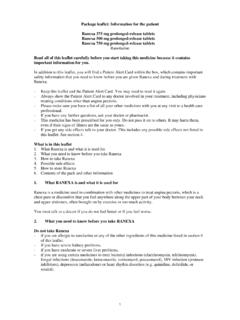Transcription of SELF CARE FORUM FACT SHEET NO. 3 (version 1.0.1 ...
1 SELF CARE FORUM FACT SHEET NO. 3 (version ) Produced by the Self Care FORUM ( ). Last revised on 4 Mar 14. Please contact Libby Whittaker 020 7421 9318 or email with comments or suggestions. Heartburn and Indigestion This fact SHEET helps you to know what s normal and what you can expect to happen if you suffer from heartburn or indigestion (also called dyspepsia). It also tells you when you should become concerned and when it s best to seek medical advice from a health professional. Useful facts Dyspepsia is common You re not alone. Symptoms in the upper abdomen may affect up to 4 out of 10 people in any one year. How does it present? Heartburn and indigestion are symptoms of pain or discomfort in the upper abdomen or chest.
2 They often result from overeating, eating high fat meals or being overweight. Timing Symptoms typically occur after meals. Other problems Dyspepsia is commonly accompanied by belching, and feeling bloated or sick. What causes dyspepsia? Common causes include acid reflux from your stomach, inflammation of the gullet, certain medicines (check the patient information leaflet), infection with a bug called helicobacter pylori (or H. pylori), or when part of the stomach squeezes through the diaphragm muscle into the chest (known as hiatus hernia). Less commonly, a stomach ulcer or cancer of the stomach or gullet may be responsible. Sometimes, no underlying cause can be found (this is known as functional dyspepsia).
3 What can I expect to happen? Duration Your symptoms will usually improve within one or two weeks. But if you find that you keep taking indigestion medicines all the time for several weeks or that your symptoms affect your day to day life, you need to consult your GP. Effect of changing your diet In about 8 out of 10 people, symptoms will improve by making lifestyle changes alone, such as healthier eating and losing weight. Avoid fatty and fried meals, and eating large meals late in the day. Also try to avoid carbonated soft drinks, coffee and alcohol. Eat slowly and chew properly. Medication If lifestyle changes alone don t work, you can expect your symptoms to improve by taking over-the-counter (OTC) or prescribed medication.
4 Investigations Most people don t need any tests. But if your symptoms aren t controlled, or your GP suspects a particular underlying cause, you may need further testing. This may include looking into your gullet and stomach with a thin and flexible tube-like camera (called endoscope) and blood or stool tests. Continued overleaf SELF CARE FORUM FACT SHEET NO. 3 (version ) Produced by the Self Care FORUM ( ). Last revised on 4 Mar 14. Please contact Libby Whittaker 020 7421 9318 or email with comments or suggestions. What can I do myself to get better now and in the future? Smoking Reduce or stop smoking, which may help improve your symptoms. OTC Medicines Various drugs that neutralise the acid in your stomach (antacids) as well as other drugs called H2-receptor antagonists and proton pump inhibitors (PPIs) are available without prescription over the counter at pharmacies, in petrol stations and in supermarkets.
5 It s best not to take these medicines for prolonged periods without consulting a pharmacist or other health professional. Visit for lists of medicines available without prescription at pharmacies and other stores. Avoiding aspirin-like drugs If you take OTC anti-inflammatory pain killers, such as aspirin or ibuprofen, regularly, consult a health professional in case these could be the cause of the indigestion. When should I seek medical help? Rarely, more serious medical problems may cause indigestion particularly if you are aged 55 or over. Seek medical advice if your symptoms do not respond to treatment or you notice any of the following: Pain and other chest/stomach symptoms You suffer from severe, persistent (longer than three weeks), worsening and unexplained pain in your upper abdomen particularly if occurring together with other symptoms, such as pain in your chest, breathlessness, sweating, feeling sick or vomiting.
6 Vomiting blood You vomit blood or dark lumps (like coffee grounds ). Dark stools Your stool colour has become very dark (looking like tar). But remember that if you take iron tablets your stool can also become black a harmless side effect which will go when you stop taking iron. Feeling faint You feel faint, or you ve collapsed. Swallowing problems You develop difficulties with swallowing. Other problems You suffer from unexplained fever, night sweats, weight loss for no apparent reason, or you notice a swelling or mass in your upper abdomen. Where can I find out more? NHS Choices ( ) has more information on how you can treat and prevent indigestion. Remember that your pharmacist can also help you with assessing your symptoms.
7






